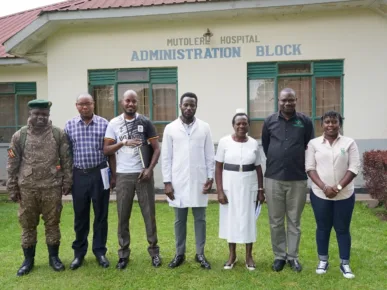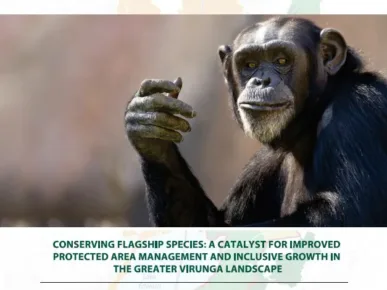On 30th July 2025, the Greater Virunga Transboundary Collaboration (GVTC), in partnership with the German Institute of Development and Sustainability (IDOS), successfully hosted the BioCAM4 Co-Design Workshop at La Palme Hotel in Musanze, Republic of Rwanda. The event brought together key stakeholders from government agencies, conservation organizations, and local communities to jointly shape the Rwanda case study for the BioCAM4 Project.

M.BioCAM4—Biodiversity Integration in Climate Adaptation and Mitigation Actions for Planet, People, and Human Health—is an international research initiative addressing the interlinked crises of biodiversity loss and climate change. Funded by the New Frontiers in Research Fund (NFRF), the German Research Foundation (DFG), and UK Research and Innovation (UKRI), the project focuses on Nature-Based Climate Actions (NBCAs), which integrate nature and biodiversity into climate mitigation and adaptation strategies. Rwanda is one of the core research sites under the project’s Work Package 2 (WP2), with GVTC as a key partner.
The Musanze workshop aimed to:
- Introduce stakeholders to the BioCAM4 research project and the planned Rwanda case study in the Volcanoes National Park region / Virunga Massif Landscape.
- Co-create a research design that aligns with local circumstances and priorities.
- Provide a platform for participants to articulate community needs and evaluate the long-term impact of ongoing Nature-based Solutions (NbS) projects.
The full-day workshop facilitated by Prof. Dr. Dombrowsky Ines, Co-Lead of WP2, IDOS assisted by Mr. Tim Möschl, PhD Candidate, IDOS and Mr. Fidele Ruzigandekwe, Deputy Executive Secretary for Programs of GVTC, featured an overview of the BioCAM4 project, detailed presentations on local NbS interventions, and interactive sessions including stakeholder mapping exercises and discussions on the research framework, methods, and project timeline.
Participants included representatives from key institutions such as the Rwanda Development Board (RDB), Rwanda Water Board (RWB), IUCN Rwanda, International Gorilla Conservation Programme (IGCP), local district officials from Nyabihu, Burera and Musanze, and community cooperatives engaged in agroforestry and watershed restoration initiatives.

By gathering diverse perspectives, the workshop ensured that the Rwanda case study will reflect the realities and aspirations of stakeholders operating in the Greater Virunga Landscape. This collaborative approach will also help amplify local voices in global climate and biodiversity policy discussions, including processes under the UNFCCC and the Convention on Biological Diversity (CBD). This research will be conducted during the period from 2026 to 2027 when the researchers will come back to present the results recommendations
Speaking at the close of the workshop, GVTC’s Deputy Executive Secretary Fidele Ruzigandekwe emphasized:
“This initiative reinforces the link between biodiversity conservation and climate resilience. Through BioCAM4, we are not only safeguarding the Greater Virunga Landscape but also contributing to global efforts on climate change adaptation and mitigation.”
Prof. Dr. Ines Dombrowsky appreciated the participation of all the participants during the meeting but also expressed her gratitude to the team of GVTC for making this workshop happen which guarantee the positive results of this project.
The findings from the Rwanda case study will contribute to BioCAM4’s broader objectives, including the development of a global Nature-Climate Initiatives Database (N-CID) and policy guidance for governments and international institutions.
BioCAM4 – Biodiversity Integration in Climate Adaptation and Mitigation Actions for Climate, People, and Human Health
BioCAM4 is coordinated by the Dahdaleh Institute for Global Health Research (York University, Canada), with consortium partners IDOS – German Institute of Development and Sustainability, Institute of Zoology (IoZ, UK), Radboud University and project partners Tropical Agricultural Research and Higher Education Center (CATIE, Costa Rica), African Research Impact Network (ARIN), and Greater Virunga Transboundary Collaboration (Africa). The project advances knowledge and policy on nature‑based climate actions that deliver co‑benefits for biodiversity, human health, and local livelihoods through global mapping and regional case studies. To learn more, visit BioCAM4: https://biocam4.com/
Report by Juvenal Mukeshimana
GVTC Program Assistant




